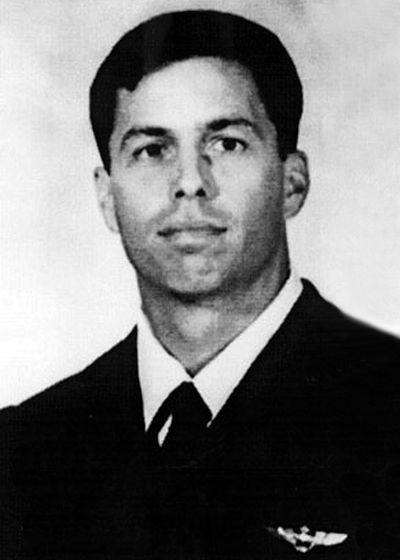Gulf War pilot’s remains found
Florida man was first casualty in conflict

WASHINGTON – Navy pilot Michael “Scott” Speicher was shot down over the Iraq desert on the first night of the Gulf War in 1991 and it was there he apparently was buried by Bedouins, the sand hiding him from the world’s mightiest military.
In a sorrowful resolution to the nearly two-decade-old question about his fate, the Pentagon disclosed Sunday it had received new information last month from an Iraqi citizen that led Marines to recover bones and skeletal fragments – enough for a positive identification.
His family issued a statement Sunday, saying, “The news that Captain Speicher has died on Iraqi soil after ejecting from his aircraft has been difficult for the family, but his actions in combat, and the search for him, will forever remain in their hearts and minds.”
President Barack Obama called the news “a reminder of the selfless service that led him to make the ultimate sacrifice for our freedom.”
“My thoughts and prayers are with his family, and I hope that the recovery of his remains will bring them a needed sense of closure,” Obama said in a statement issued Sunday.
Shot down over west-central Iraq on a combat mission in his FA-18 Hornet on Jan. 17, 1991, Speicher was declared killed by the Pentagon hours later. Defense Secretary Dick Cheney went on television and announced the U.S. had suffered its first casualty of the war.
Ten years later, the Navy changed his status to missing in action, citing an absence of evidence that Speicher had died. In October 2002, the Navy switched his status to “missing/captured,” although it has never said what evidence it had that he ever was in captivity. More reviews followed, without definitive answers.
From outside Jacksonville, Fla., Speicher’s family continued to press the military to do more.
His story never waned in Jacksonville. A large banner flying outside a firefighters’ credit union has a photo of him with the words: “Free Scott Speicher.” At his church, a memorial was put up in his honor. The tennis complex at his alma mater, Florida State University, was named for him.
A high school classmate who helped form the group “Friends Working to Free Scott Speicher” said Sunday his biggest fear was that Speicher had been taken alive and tortured.
“This whole thing has been so surreal for all of the people who have known Scott,” said Nels Jensen, 52, who now lives in Arkansas.
To the top Navy officer, the discovery is evidence of the military’s commitment to bring its troops home. “Our Navy will never give up looking for a shipmate, regardless of how long or how difficult that search may be,” said Adm. Gary Roughead, chief of Naval Operations.
Over the years, critics contended the Navy had not done enough, particularly right after the crash, to search for the 33-year-old Speicher. A lieutenant commander when he went missing, Speicher later reached the rank of captain because he kept receiving promotions while his status was unknown.
A number of new leads surfaced after the U.S.-led invasion of Iraq in 2003, including the discovery of what some believed were the initials “MSS” scratched into the wall of an Iraqi prison. More than 50 sites were checked by military search crews in the months after the invasion – hospitals, prisons, security archives, homes and the original site where Speicher’s plane crashed, about 100 miles north of the Saudi Arabian border.
Crews first visited the site in 1995. They found wings, the canopy and unexploded ordnance, but no Speicher.
Officials said Sunday that they got new information last month from an Iraqi citizen, prompting Marines stationed in the western province of Anbar to visit a location in the desert that was believed to be the crash site. The Iraqi said he knew of two other Iraqis who recalled an American jet crashing and the remains of the pilot being buried in the desert, the Pentagon said.
Gen. Ray Odierno, the top U.S. commander in Iraq, conveyed condolences to Speicher’s family in a statement from Baghdad. “Although we cannot fully understand the sense of loss, or the pain his family has shouldered throughout the years of waiting, we hope they can find solace in his dignified and honorable return home,” he said.